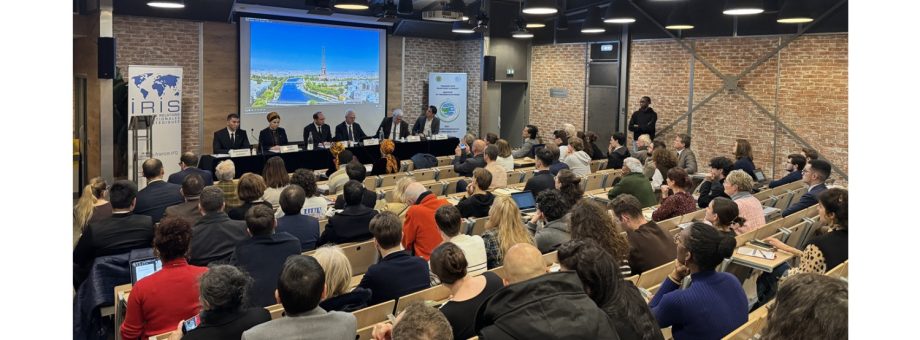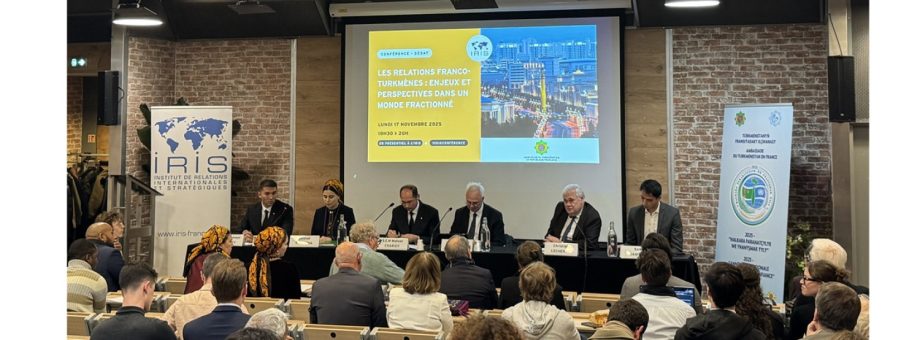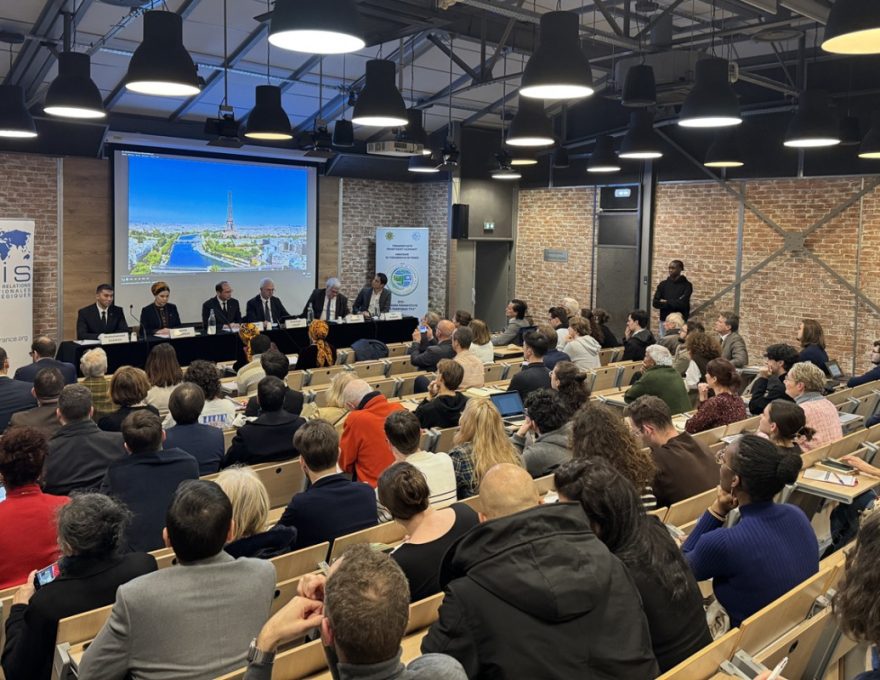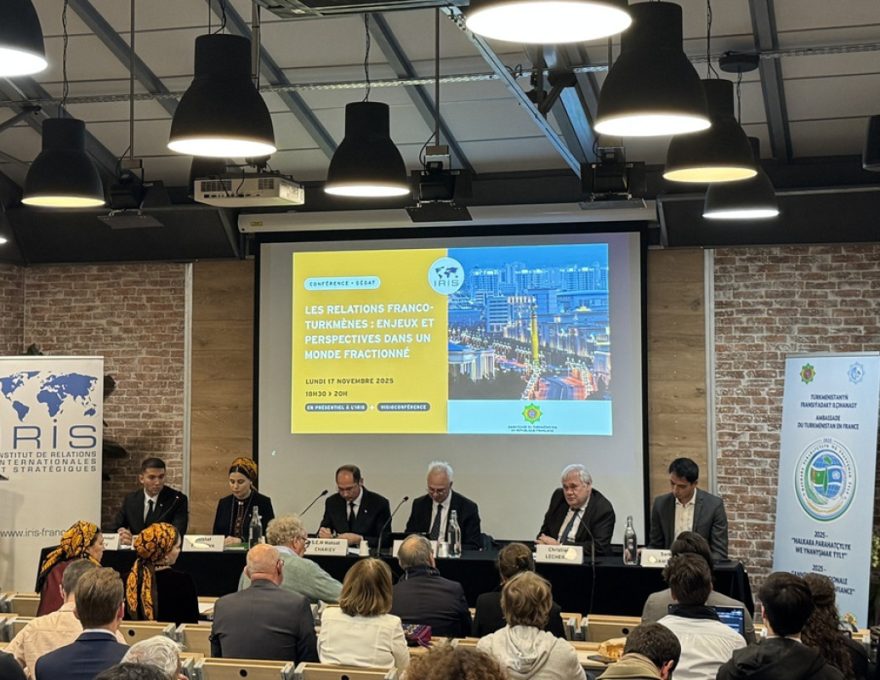A conference titled “Turkmen–French relations: Challenges and Prospects in a Fragmented World” was held in Paris
On 18 November 2025, a conference titled “Turkmen–French Relations: Challenges and Prospects in a Fragmented World” was held in the conference hall of the Institut de Relations Internationales et Stratégiques (IRIS) in Paris. The event was jointly organized by IRIS and the Embassy of Turkmenistan in France.
It was dedicated to the International Year of Peace and Trust, the 30th anniversary of Turkmenistan’s permanent Neutrality, as well as the promotion of the literary heritage of the great Turkmen poet Magtymguly Fragi.
The conference was attended by representatives of the diplomatic, academic, and cultural circles of Turkmenistan and France, research centers, academic institutions, public organizations, and scholars of the Magtymguly Institute of Language, Literature and National Manuscripts of the Academy of Sciences of Turkmenistan.
Speakers included Maksat Charyyev, Ambassador of Turkmenistan to France; Gulsat Yusupova, Rector of the Institute of International Relations of the MFA of Turkmenistan; Christian Lechervy, Ambassador of France to Myanmar and former Ambassador of France to Turkmenistan; Sami Ramdani, IRIS researcher; Emmanuel Lincot, Director of Research at IRIS; and Shamuhammet Charyyev, lecturer at Magtymguly Turkmen State University.
In his remarks, Ambassador Charyyev emphasized that, in a context of increasing global fragmentation, the international community increasingly needs stable models of engagement based on trust and the diplomacy of dialogue. He noted that Turkmenistan has consistently pursued its policy of permanent neutrality for thirty years, and that this status has been recognized three times by the UN General Assembly. According to the Ambassador, neutrality has become the foundation of the country’s foreign policy, ensuring a predictable course, openness to partnership, and Turkmenistan’s contribution to strengthening peace and stability in Central Asia.
Speaking about bilateral relations with France, Ambassador Charyyev highlighted the significance of the official visit of the National Leader of the Turkmen People, Chairman of the Halk Maslahaty of Turkmenistan, Gurbanguly Berdimuhamedov, to Paris on 5 May 2025. He stressed that the visit became a turning point in the development of relations and opened new areas of cooperation — in energy, ecology, water resources, digitalization, space technologies, education, science, and cultural heritage. The Ambassador underlined that active practical work is already underway on all signed documents: working groups are being established, technical assignments coordinated, and expert exchanges carried out. He paid particular attention to opportunities for cooperation in greening the energy sector, including methane-emission monitoring, the introduction of new technologies, and the participation of French companies in relevant projects.
Rector of the Institute of International Relations of the MFA of Turkmenistan, Gulsat Yusupova, detailed the international recognition of Turkmenistan’s policy of permanent neutrality and its role in promoting the ideas of peace and trust. She emphasized the importance of educational and scientific ties with France, spoke about French-language teaching, the work of cultural centers, and the growing interest of Turkmen students in the francophone direction.
Lecturer of Magtymguly Turkmen State University, Shamuhammet Charyyev, delivered a report on the significance of Magtymguly Fragi’s work, noting the strong links between Turkmen and French humanistic traditions. He emphasized that the poet’s philosophy serves as a spiritual bridge between the two countries.
Ambassador Christian Lechervy highlighted Turkmenistan’s role as a key partner of France in Central Asia and stressed the importance of humanitarian and educational cooperation, which he had observed during his diplomatic service in Ashgabat.
IRIS Director of Research Emmanuel Lincot pointed out the importance of Turkmenistan’s neutrality as a factor of predictability and stability, as well as the growing interest of the French academic community in Turkmen culture and literature.
IRIS researcher Sami Ramdani emphasized Turkmenistan’s strategic significance in global energy, praised the country’s environmental efforts and methane-reduction initiatives, and noted the prospects for cooperation with the EU and France in green energy.
As part of the conference, a book exhibition was organized featuring works by President Serdar Berdimuhamedov and the National Leader of the Turkmen People Gurbanguly Berdimuhamedov, publications on the life and work of Magtymguly Fragi, as well as materials dedicated to the Year of Peace and Trust and the 30th anniversary of neutrality. Participants showed great interest in the exhibition and noted the high cultural and scholarly level of the presented materials.
The event concluded with a tasting of Turkmen national cuisine, which became a vivid cultural highlight of the conference.


 NEWS
NEWS



